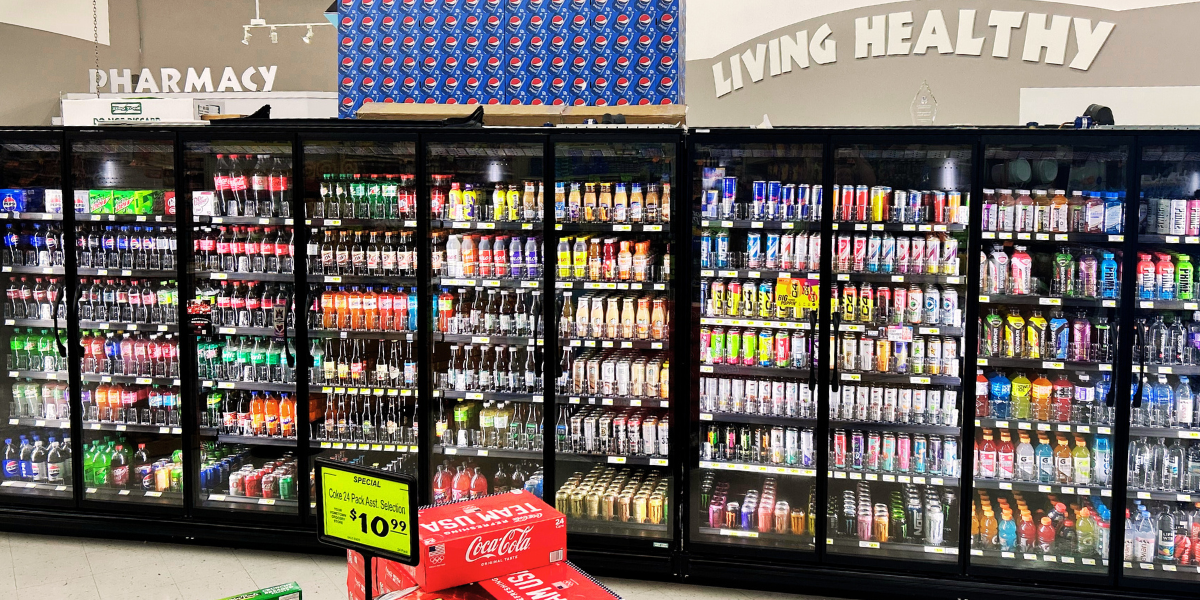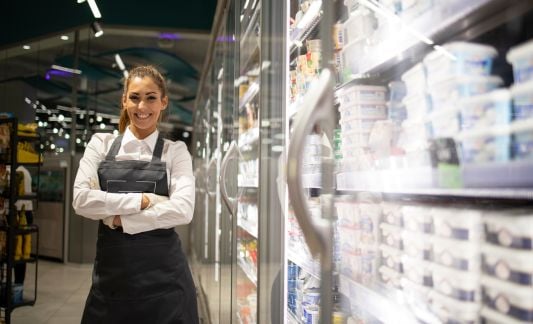Help Isom IGA recover from devasting floods

5 min read
The Cameron Market Leverages Grants to Enhance Sustainability and Customer Experience
Written by Carlie Wagner
Apr 8, 2025
Grocery stores are often at the front of evolving regulations, from increasing food traceability to requiring more Earth-friendly cooling system refrigerants. While the U.S. Environmental Protection Agency (EPA) is considering rolling back some of the regulations put forth in the AIM Act, Ratio Institute Co-founder Jonathan Tan said retailers shouldn't wait for potential regulations to upgrade.
"Independents have an opportunity now to take control of the most impactful portion of their business," Tan said. "Business as usual regardless of regulation is going to negatively impact many independents to the point of threatening the ability to continue operations."
Put simply, the benefit of installing energy efficient appliances and safer refrigerants will save grocers money in the long run by reducing energy bills. And federal or state grants are still available to offset the upfront cost of these programs.
To better understand the impact these grants and upgrades can have on an independent grocery store, we spoke with Tony Clark of The Cameron Market in Cameron, Missouri, who secured funding to overhaul their energy systems through the USDA Rural Energy for America Program (REAP). The result? Lower costs, a modernized shopping experience, and a more sustainable business.
Growth and Improvements
The Cameron Market’s story began over 60 years ago when Ralph and Evelyn Koch bought the Food Fair in Sweet Springs. Their family business expanded over the years and is now run by third-generation owners Tony and Ronni Clark. Today, the Clarks oversee two grocery stores and four pharmacies, carrying on a legacy of serving their communities.
When the family purchased the Cameron location in 2013, they immediately looked for ways to improve efficiency. One of their first changes was replacing open front cases with new efficient coolers with café doors in their dairy, lunchmeat, and salad cases. They also converted the low-temp rack system to an energy-efficient protocol unit for low-temperature cases. These changes led to a 40% reduction in utility costs – a significant savings that reinforced their commitment to energy efficiency
Still, they knew more improvements were needed. When Clark came across an article about REAP in a newsletter, he was immediately intrigued. The program offered a promising path to further reduce costs and improve store operations.
First Steps
Understanding and applying for government grants can be overwhelming, but Clark found a valuable partner to take on the complexities of the process.
“The first step was connecting with Ratio Institute,” Clark said. “They managed the intricacies while we provided the necessary data, like utility bills and contractor bids. It was a great partnership.”
Ratio Institute Co-founder Peter Cooke further emphasized the importance of collaboration, saying, “Gathering clean information is the hardest part. But in my opinion, gathering all that paperwork to secure funding that has such a huge impact on your business is worth it. Programs like REAP help grocers like Tony not only cut costs but also strengthen their ability to serve their communities effectively.”
With Ratio Institute’s support, The Cameron Market successfully navigated the application process, setting the stage for a storewide transformation.
Energy Efficiency Upgrades with REAP
They began with a comprehensive energy audit to identify areas for improvement, performed by Ratio Institute. The results guided a strategic plan to upgrade outdated equipment with energy-efficient alternatives that would deliver long-term savings.
With a $323,000 REAP matching grant that covered nearly 50% of their approximately $650,000 investment, the store replaced aging medium-temperature refrigeration units, consolidated nine inefficient soda coolers into a single 20-foot energy-efficient beverage cooler, upgraded deli and bakery cases, and added LED lighting throughout the store.
These upgrades particularly revitalized the bakery and deli departments. An outdated cheese island was replaced with modern, low-profile deli cases, creating space for a sushi chef, an expanded salad bar, and a refreshed bakery area. These enhancements streamlined operations and made the store more inviting.
“We were able to uplift our whole grab-and-go section. It really helped the higher profit departments,” Clark explained. “The customers responded well to the upgrades that we’ve done.”

Impressive Results: Reduced Costs and Increased Sales
The results were both immediate and significant. After completing the upgrades, The Cameron Market saw an additional 25% reduction in their utility bills – on top of the savings from previous years. Meanwhile, sales increased, particularly in high-margin sections like the deli and bakery, demonstrating the tangible benefits of the REAP investment.
Customers also noticed the difference. “They’re excited for the changes, new opportunities, and new selections,” Clark explained. “You constantly need to provide for your customers, and without these programs, I’m just not sure that’s always an option for independent retailers.”
Challenges and Rewards
While the benefits were clear, securing the grant required careful planning and financial commitment. The application process required the Clarks to provide utility data and bids for equipment. However, with the support of Ratio Institute, it was easy to navigate the complexities of the program.
Another challenge was funding the project upfront before receiving reimbursement from the USDA. Despite this hurdle, REAP has been a valuable investment for the store. “It’s been absolutely worth it,” said Clark.
Not every independent inspired by Clark's success story is eligible for the same grants and funding opportunities. For example, the REAP application window is currently closed until July 1, 2025. In the meantime, Tan encourages grocers to reach out to Ratio Institute about state-level grants and opportunities.
"There are still plenty of options out there," Tan said. "Ratio Institute can work with you to determine what grant options are available in your area."
A Model for Rural Independents
The Cameron Market’s success offers a blueprint for other independent retailers looking to remain competitive.
“With rising minimum wages and other operational costs, you have to find ways to cut expenses without raising prices too much,” Clark explained. “In 2015, the minimum wage was $7.65 an hour. By 2026, it’s going to be $15. Either you raise prices, or you cut costs.”
For The Cameron Market, energy efficiency was the answer.
“This program gave us the chance to cut expenses and pass those savings on to our customers,” Clark said. “It’s a great way for independents to stay competitive without compromising service or quality.”
Looking Ahead
The Cameron Market’s transformation proves that, with the right resources and partnerships, rural independent grocers can thrive in a competitive retail environment. By working alongside Ratio Institute and leveraging REAP, the store lowered operating costs, enhanced energy efficiency, and improved the shopping experience.
But they aren’t stopping there. The Clarks continue exploring new ways to innovate and improve store operations, ensuring long-term success. Their son Brett is already involved in the business, setting the stage for the next generation.
“We’re always thinking about how to improve,” Clark said. “Whether it’s through energy efficiency or improving the customer experience, we’re always striving to provide more for our community.”
With a strong foundation in place, a commitment to innovation, and the next generation actively involved, The Cameron Market is well-positioned for continued success in the years ahead.
You May Also Like
These Stories on Sustainability
Oct 17, 2024 9:13:18 AM |
2 min read
Jul 17, 2024 10:46:34 AM |
5 min read



No Comments Yet
Let us know what you think